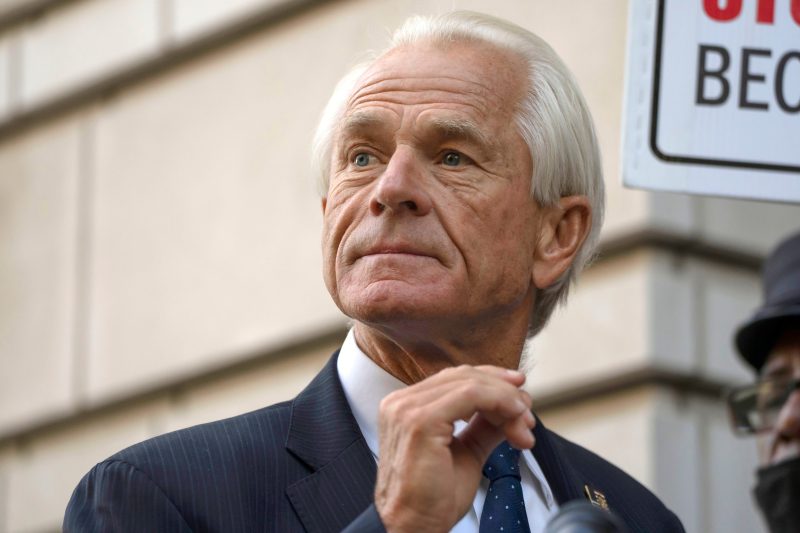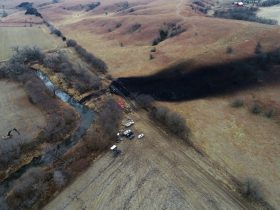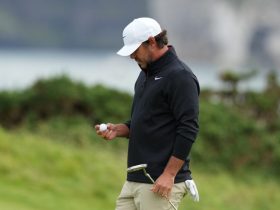Peter Navarro, a senior Trump White House aide and vocal election denier who has said he helped hatch a legislative scheme to overturn the results of the 2020 presidential race, was found guilty Thursday of contempt of Congress for refusing to cooperate with the House committee investigating the Jan. 6, 2021, attack on the U.S. Capitol.
In a federal trial in Washington that included just one day of testimony from three prosecution witnesses, and no witnesses for Navarro, the 74-year-old former trade adviser was convicted of the two contempt charges he faced, each punishable by up to a year behind bars.
With right-wing provocateur Stephen K. Bannon, who was found guilty last summer of contempt of Congress, Navarro is the second high-ranking Trump official to be convicted in a criminal case related to efforts to undo President Biden’s victory at the polls. Both men are loud proponents of widely debunked claims that former president Donald Trump was denied reelection because of voter fraud in key states.
Like Bannon, Navarro defied a subpoena from the select committee that demanded information about his “stolen election” falsehoods and details of a brazen plan to reverse Biden’s win through legislative machinations on Jan. 6, 2021, when Congress met in a joint session to formally certify the Biden win. The session was interrupted for more than six hours after hundreds of Trump supporters stormed the Capitol.
In refusing to cooperate with the bipartisan panel, the two former White House aides cited executive privilege, saying Trump, after he left office, instructed them not to provide testimony or documents regarding matters the committee was investigating.
But neither defendant was allowed to raise executive privilege as a trial defense. And with no strong argument for an acquittal, the guilty verdicts came relatively swiftly. Navarro, like Bannon, was accused of two counts of contempt, one for withholding records, the other for refusing to give a deposition. The jury in Navarro’s case, in U.S. District Court, began deliberating just before 11 a.m. Thursday and, after breaking for lunch, returned a verdict just after 4 p.m. The panel of eight men and four women declined to comment upon leaving the courthouse.
“Peter Navarro made a choice,” Assistant U.S. Attorney Elizabeth Aloi said in her closing argument Thursday. “He chose not to comply with a congressional subpoena. Our government only works when people play by the rules. And it only works if they are held accountable when they do not.”
Bannon, found guilty in the same courthouse in July 2022 after 2½ hours of jury deliberations, was sentenced to four months in prison. He remains free pending the outcome of his appeal. Judge Amit P. Mehta set Navarro’s sentencing for Jan. 12.
Navarro, an economist and top Trump aide for all four years of the administration, and Bannon, a Trump political adviser who was chief White House strategist for seven months in 2017, are the first defendants to face potential incarceration for defying a congressional subpoena in more than half a century under a federal law that is rarely prosecuted.
Since Navarro received the subpoena from the now-disbanded select committee in February 2022, Trump, who is again running for president, has been accused of 91 felonies in four indictments, including four federal charges stemming from efforts to overturn the election.
As with Bannon, Navarro’s best hope for an acquittal was to argue that he was barred from obeying the subpoena because Trump, after leaving office, invoked executive privilege in conversations with him. The privilege is meant to protect the privacy of discussions between presidents and their close aides. But Mehta prohibited the argument as a trial defense for Navarro, citing scant evidence that such conversations took place.
“The day Judge Mehta ruled that I could not use executive privilege as a defense, the die was cast,” Navarro told reporters after his conviction. “This was pro forma. We knew going in what the verdict would be. That’s why it’s going to the appeals court. … I am willing to go to prison to settle this issue.”
One of his attorneys, John P. Rowley III, said the prosecution of Navarro raises important questions about the separation of powers between the legislative and executive branches of government and the application of executive privilege.
“This is a landmark case,” Rowley said. “This case won’t be decided here finally. It’ll be decided by the D.C. [Circuit] Court of Appeals. This is the first time that a senior aide who served his president for four years has ever been” put on trial for contempt of Congress.
Standing outside the courthouse, Navarro excoriated his political and ideological foes, including Rep. Nancy Pelosi (D-Calif.), the former House speaker, and Attorney General Merrick Garland.
“I get a House of Representatives controlled by Nancy Pelosi trying to put me in prison,” he said. “Why? Because I’m a Trump guy! And I get a Biden White House and a Biden Department of Justice. Does anybody want to tell me I’d be here if Republicans had held the House? Or if President Trump was in office? No! No! So a little bit of righteous indignation.”
Because prosecutors were spared a trial fight over the validity of Trump’s purported assertion of executive privilege, they had to prove only that Navarro received the subpoena, that the information it sought was pertinent to the committee’s investigation, and that Navarro willfully failed to comply with its demands for testimony and documents.
To that end, prosecutors summoned just three witnesses: David Buckley, who was the committee’s staff director, and two of the panel’s senior investigative counsels, Daniel George and Marc Harris. Navarro’s lead attorney, Stanley E. Woodward Jr., called no witnesses and cross-examined only George, for 15 minutes.
Harris, who was to have been the main inquisitor in Navarro’s scheduled deposition, told the jury that he had planned to question the former Trump aide on several topics, including the legislative scheme to thwart the counting of electoral ballots and Navarro’s false claims of widespread voting irregularities. Navarro has said he compiled his fraud “research” in a three-volume report that he personally gave to Trump before Jan. 6 and posted online.
Committee investigators wanted to explore any nexus among Navarro’s “stolen election” falsehoods, the maneuvering to halt the electoral-ballot count, and the Capitol attack, Harris testified. He said Navarro was served with a subpoena because it “became clear” to the panel’s staff that he had been “fomenting” violence by “contributing to uncertainty” about Biden’s victory, which “directly fed into” the Capitol mob’s rage.
Navarro’s hamstrung defense, meanwhile, was reduced to long-shot arguments.
In asking Mehta to issue verdicts of not guilty from the bench before jury deliberations began, Woodward, without the jurors present, implored the judge to consider the possibility that Navarro didn’t have the documents that the committee wanted. Woodward said prosecutors had failed to prove that his client possessed the type of records listed in the subpoena, meaning he should be acquitted of contempt on that count.
Yet Navarro has never asserted in court or to the committee that he did not have the documents.
As for the contempt charge involving testimony, Woodward said Navarro should be acquitted because prosecutors had failed to prove that he “willfully” missed the scheduled deposition. Federal case law holds that an action isn’t willful if it stems from a “mistake, accident” or other innocent occurrence. “We don’t know that he wasn’t stuck on the Metro,” Woodward told the judge.
Was he?
“I don’t know.”
Woodward later focused on the willfulness issue in his closing argument to the jury, saying prosecutors had produced “no evidence” that Navarro’s lack of response to the subpoena was not a result of “inadvertence, accident or mistake.”
In interviews with the Daily Beast and other media outlets before he was indicted last year, and in a 2021 memoir, Navarro said his and Bannon’s legislative scheme involved dragging out the process of tallying electoral votes on Jan. 6, 2021. Trump loyalists in the House and Senate would contest the ballots from six swing states that Biden had won, and each challenge would prompt four hours of debate, resulting in a nationally televised 24-hour spectacle.
According to Navarro, his job was to supply Trump-friendly lawmakers with volumes of “evidence” regarding voter fraud, to justify the challenges, while Bannon’s role was to whip support for the plan among Republicans in Congress. The two called their strategy “the Green Bay Sweep,” a football reference to an end-run play made famous in the 1950s by coach Vince Lombardi’s Green Bay Packers.
The goal was to pressure Vice President Mike Pence, who was presiding over the joint session, to return the electoral votes to the states for reexamination. Eventually under the plan, the House would wind up choosing the next president, with the 50 state delegations each casting a single vote to decide the election. While Democrats outnumbered Republicans in the chamber, Republicans controlled a majority of delegations.
The outlandish play broke down after the Capitol riot when Pence refused to go along with it.
Bannon and defense attorneys in his contempt trial did not respond to emails seeking comment on Navarro’s account of the scheme.
Navarro told Rolling Stone that Trump wanted “only peace and calm” on Jan. 6 “so that we could meticulously implement the Green Bay Packers Sweep.” The House select committee later concluded otherwise, however, saying the “the central cause” of the riot “was one man, former president Donald Trump, who many others followed.”
In the contempt case, prosecutor John Crabb Jr. argued that Navarro, in refusing to cooperate with the inquiry, “acted as if he’s above the law. But he isn’t above the law. No one is.”
Spencer S. Hsu contributed to this report.








